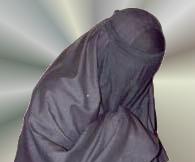IS THE FEMALE VOICE AWRAH?
A Personal Opinion By Amina H.The matter or whether
the female voice is awrah and should not be heard in public is a problem
that has been discussed at length by scholars throughout the ages.
As a Muslimah, I have sought guidance from the writings of scholars
who have debated this point, but I have also studied this problem,
both from a theological point of view, and also from a practical aspect. First and foremost
is the ayah from the Quran From this ayah
we can clearly see that the voice of a woman CAN in fact cause fitna
and, if a corrupt man hears it, can cause evil desires in his heart
to grow. And when is says 'be not soft in speech', I have to see accept
women have very soft voices naturally. I know that I do. 'The Prophet
(SAW) said, "The saying 'Sub Han Allah' is for men and clapping
is for women." (If something happens in the prayer, the men can
invite the attention of the Imam by saying "Sub Han Allah".
And women, by clapping their hands). Sahih Al-Bukhari Vol #2, Book
#22, Hadith #295. So, having read those
points, it is surely clear that we can now see this is one of the
strong daleels. For, if the female voice was to be heard, then why
would women clap? The next is
in the fatwa by Shaikh Ibn Jibreen, in the book "Islamic Fatawa
Regarding Women" where the Shaikh mentions that the voice of
the woman is Awrah and he quotes his proofs and then quotes that in
shariyya a woman is also not allowed to give a general adan where
men can hear her. Nor may she lead salah where men can hear her. Even
in Hajj she is not supposed to raise her voice during the talbiyah,
except only so that her companion can hear it. So based on this, The
Shaikh gave the fatwa that the female is awrah and can only be heard
by men in case of extreme need or when she is forced too. Even then
it should not be soft and flirtatious. More generally, I
would return back to the Quran again. Sura Al-Ahzab ayah#53 ........ And finally
from Hadith....... Sahih Bukhari Volume 7, Book 62, Hadith Number
159: and Agreed Upon by Imaam Muslim. (This also can be found in the
book Islamic Hijab from the Jamiatul Ulama Junubi Africa, page #9) 'Allah's Apostle
said, "Beware of entering upon the ladies (mingling with them)." So what do we learn from all this? Firstly we know that "Women are a place for fulfilment of desire for men. They are inclined to them by natural impulses for men. They are inclined to them by natural impulses that make them desire and appreciate them." (The Standing Committee in a written reply to a question about the relationship between men and women) For this reason and others, Allah (swt) has ordered the believers that, when they ask anything of women, that they ask from behind a curtain. Even allowing
for that, Allah (swt) has also prohibited women, when they speak with
men, to be flirtatious or soft in their speech in order that those
hearing them may not be moved by desire. Clearly, we Muslimahs must mix with non-mahram men as little as possible and speak to them only if it is essential. BUT................................ I hope I can
keep any flirtatious tone out of my voice, but what about it being
'soft'? Here I come up against a very real problem. As I said earlier,
my voice is naturally soft and I can't harden it as an actor might.
So I am faced with the problem of disobeying the words of Allah (swt)
if I speak to a non-mahram man at all BECAUSE I am bound to speak
in a soft voice. Some people might say that I am splitting hairs in
raising this point. But, to me at least, it is the bedrock on which
I based my views on this subjects. I (and the majority of women, I
believe) naturally speak softly. So I should NOT speak to non-mahram
men. For me this is simple and plain. With my academic background, I like things to be logical and for problems to be resolved as neatly as 'A+B=C QED C-A=B' Here I have such a logical answer. This time the equation is: 'If you are a woman and speak softly, you must not speak to non-mahram men. I am a woman and I speak softly; QED I must not speak to non-mahram men.' To me, that
makes perfect sense and removes my doubts, even if the writing in
Hadith did not support this view. On a purely practical note, surely it is silly (to say the least) for us to wear hijaab and proper hijaab, and for many of us women to veil fully, to observe 'hijaab of the eyes', and then to talk freely to non-mahram men? We try to dress and cover-up in a modest manner, concealing our charms from the opposite sex, so why spoil all that by flirting or even speaking with non mahram men? Sadly, many of us have witnessed women who do just that, and it grieves me deeply when I see such behavior. So insha'Allah this article may convince those ladies who still talk openly with non mahram men that such behavior is both undesirable and against the teaching of The Holy Quran and of Hadith - that much I hope I have successfully argued in this article. Ramadan 1420AH |
